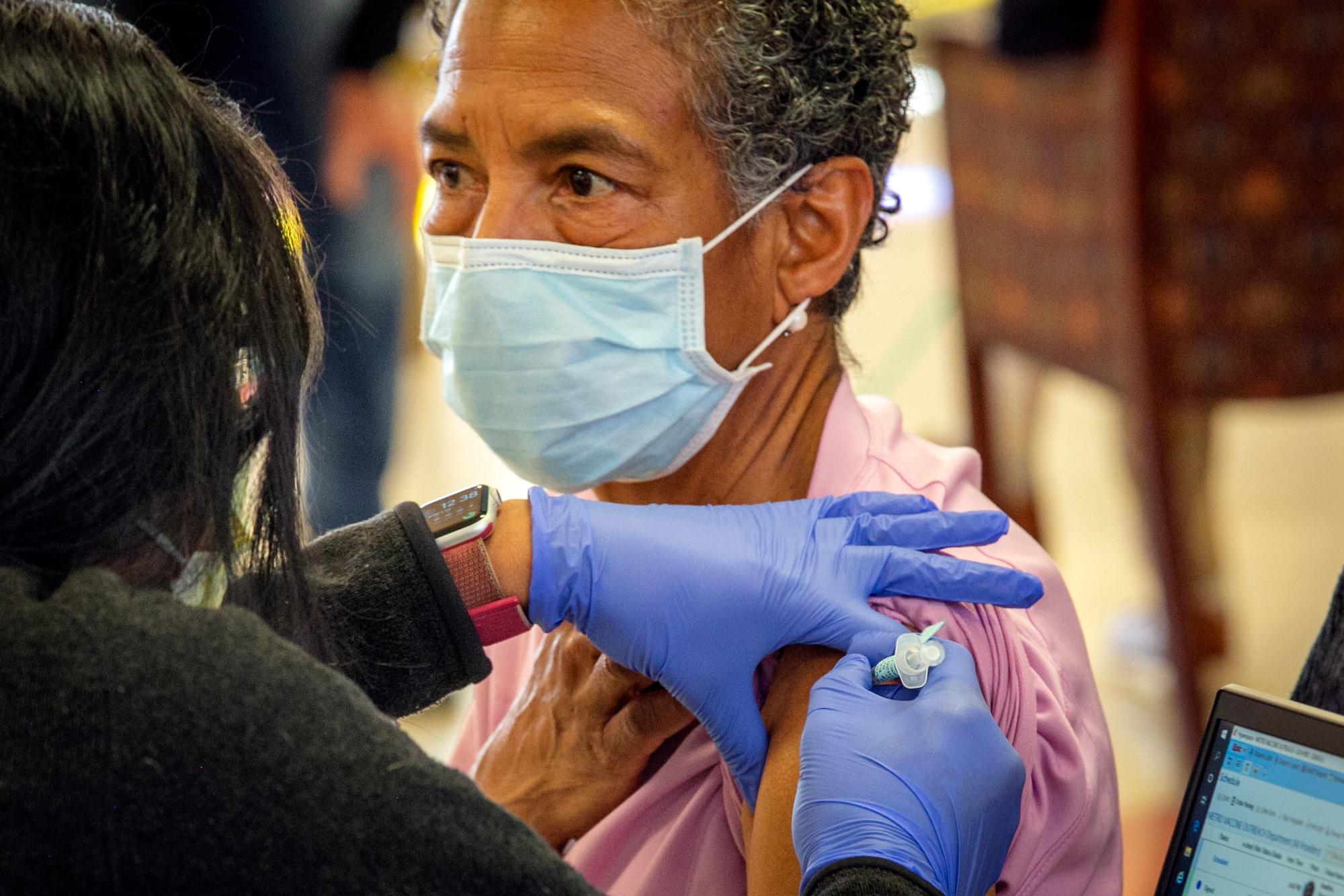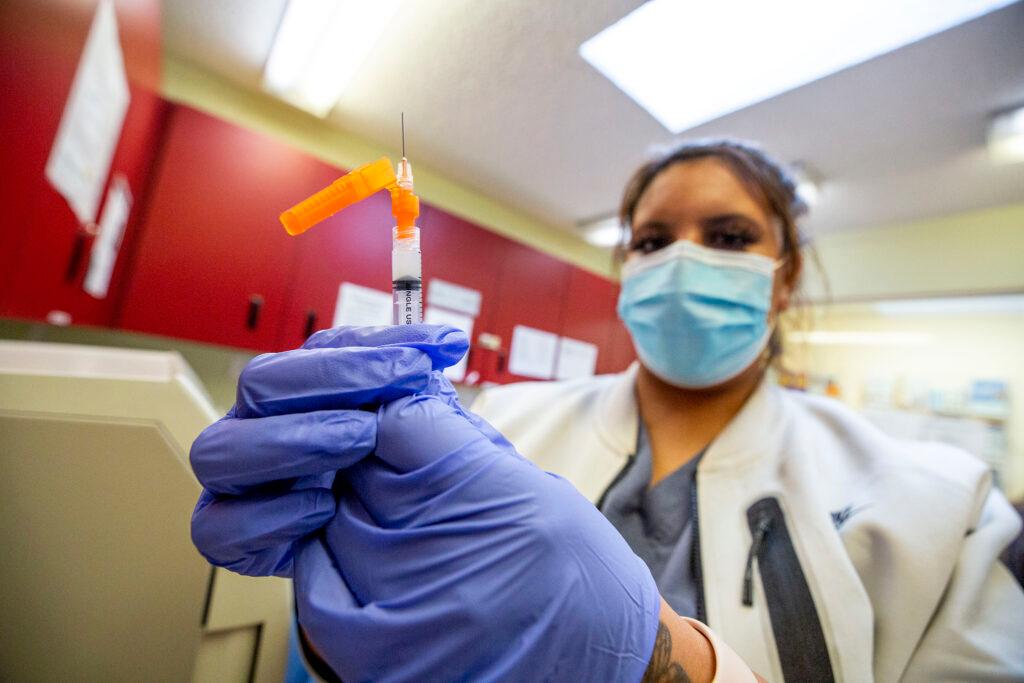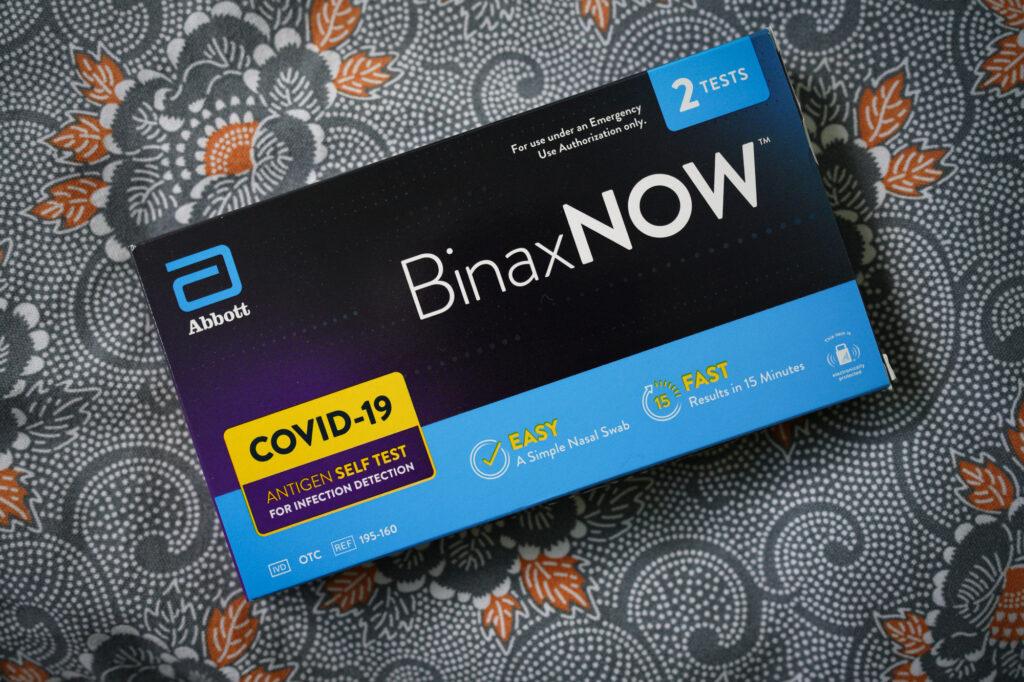
We all love the tasty Thanksgiving turkey and scrumptious stuffing. But safe to say no one wants to bring COVID-19 home with the leftovers. Ugh, right?
But all the key coronavirus indicators in Colorado are pointing toward a rise in cases, and hospitalizations are as high as they’ve been since the start of 2023, with millions of thousands of Coloradans gathering and traveling over the holidays.
Health officials, infectious disease experts and doctors say common sense precautions like getting a coronavirus vaccine shot now is their best advice to steer clear of COVID-driven congestion, cough, aches and other unpleasantries.
“The most important precaution is staying up to date on COVID-19 vaccines, the flu vaccine, and, if eligible, the RSV vaccines,” said Dr. Anuj Mehta, a pulmonary care physician at Denver Health, and member of the Colorado Vaccine Equity Taskforce.
“Our data continues to show individuals who are unvaccinated are at higher risk of hospitalization and death due to COVID 19,” said Dr. Rachel Herlihy, the state epidemiologist. “That continues to be true.”
“Get vaccinated!!!,” said UC Berkeley's Dr. John Swartzberg, a clinical professor emeritus and expert in infectious diseases, via email. “This is the number one thing to do.”
Another key tip: pay attention to air quality, where respiratory viruses can spread.
“Ventilation and filtration continue to be the techniques that scientists recommend for all indoor locations,” said Jose-Luis Jimenez, a chemistry professor at the University of Colorado Boulder.
Seasonal uptick might be here to stay
The pattern over the previous three years suggests that COVID starts its surge around Halloween and reaches its zenith toward the end of January, he said.
Swartzberg said he expects we will see the same this winter, but the surge should be considerably less than the previous years. There’s no uber-worrisome variant on the horizon at the moment, but “that could change quickly, of course,” he noted. And, due to prior infection and vaccination, population immunity is much higher than previously, he said.
Colorado hospitalizations are at their highest point since the start of the year. The number of patients in the hospital with confirmed cases rose the week ending Oct. 31 by about twenty to 257, according to the state’s dashboard. The figure has been rising since early August and is similar to numbers this time last year.
The state's weekly test positivity rate is also rising.
Twice as many utilities, including some large ones on the Front Range, report increases, compared with the number showing drops, of the virus found in wastewater.

Only one in 10 Coloradans have gotten a coronavirus vaccine shot so far this fall
More than 562-thousand doses of this fall's coronavirus vaccine have been administered statewide, according to the state health department. That's about a 10th of the overall population and lower than earlier versions of the vaccine at this point in the fall.
That’s concerning, said May Chu, an epidemiologist at the Colorado School of Public Health. “Overall uptake needs to get up to over 50 percent to ensure continued population protection (the famous herd protection),” said Chu, a senior investigator for the Center for Global Health.
Dr. Michelle Barron, an infectious disease expert at UCHealth, urged people, especially those who are older and more vulnerable, to get vaccinated with a COVID-19 shot.
“Just be smart in terms of taking precautions when people are older,” she said. “Encourage those people in your life that do fit those descriptions to get their shots for their own protection.”
Herlihy said that she expected more residents to get vaccinated as the holidays approach but suggested not waiting.
“You need several weeks, probably at least two weeks, to get to those full protective levels of your antibodies, " she said. “So now is absolutely the time, in the next two weeks, to get those vaccines.”
In addition to protecting your relatives and loved-ones, the vaccine still protects individuals from developing lasting complications from COVID.
“COVID-19 vaccines likely reduce the chances of getting long COVID-19 which is critically important,” Mehta said.
Doctors and health officials urge people to get a COVID-19 vaccine, flu vaccine, and a shot against the respiratory virus RSV, if eligible. The Centers for Disease Control and Prevention recommends adults 60 and older have the option to receive a single dose of RSV vaccine. That’s based on discussions between the patient and their health provider.
The state’s dashboard shows a slight uptick in flu and RSV since Oct. 1, but at this point COVID-19 is a much greater concern.
Finding the vaccines
The transition from a federal coronavirus vaccination push to one run by the commercial health care system has left some Coloradans scrambling to find vaccine doses. But the best advice is to stay persistent, said doctors and public health officials.
“We certainly know it has been a challenging transition, but we know that more vaccines are coming,” said Herlihy. “Not all of the vaccine arrives at once. We know that it's a rolling process where more and more vaccine continues to roll out.”
She encouraged parents and those looking for vaccines to continue to return to their primary care provider, local public health agency or pharmacy.
“There are some access and insurance issues that need to be worked out,” Mehta said. With pharmacies so understaffed, he has heard from many people that getting an appointment is hard and that even with an appointment, wait times can be long.
“This will be an issue for lots of pharmacy services until commercial pharmacies improve their staffing levels,” he said.

The usual precautions still work
Other familiar pandemic precautions perhaps are not as top of mind for many as they once were. But they still work and, looking ahead, are as important as ever.
Indoor air quality is key.
People concerned about sicknesses ruining holiday plans could do one simple thing to reduce risk of infection, according to aerosol experts, think about ventilation and airflow as you go about your day.
"With the pandemic it has become much clearer to scientists that most respiratory diseases are airborne. Some infected people exhale viruses, which float in the air, and we can get infected by inhaling that air,” said CU aerosol expert Jimenez.
He said cleaning the air has become very important, especially in the winter season where respiratory viruses are at their highest levels.
At a Thanksgiving dinner, crack some windows or doors and deploy HEPA filters if you have them. Air things out.
A recent segment on CBS’s 60 Minutes spotlighted how the pandemic had heightened awareness of the impact of indoor air quality on human health.
Chu said researchers at CU Anschutz and CU-Boulder have teamed with the state health department on a CDC-funded study of indoor air quality in K--12 schools, with an aim to set standards.
She said the project has distributed over 400,000 HEPA filter air cleaners in over 27,000 school classrooms in the state. “We hope to collectively come up with what is good, safe air for indoor situations, hence, schools, concerts, sports events,” she said.
Meantime, everyone can take individual precautions to avoid catching bugs.
“I continue to wear a high-quality mask indoors in public places,” said Swartzberg, a grandfather.
He said he was going to his daughter’s home in Washington, D.C., for Thanksgiving. “We’ll have a high-quality mask on in the airport and on the plane.”
His daughter is asking everyone invited to not come if they have any symptoms and to do a rapid test on Thanksgiving Day.
Other common sense measures are as important as ever. “Stay home if you are sick,” said Mehta. “Avoid people who might be sick. If you have recently had COVID-19, wearing a mask will protect your loved ones.”
If the pandemic has taught us anything, it’s that viruses spread easily and some people are especially vulnerable. “Like, you don't want to kill grandma or grandpa,” by unwittingly passing along a bug, said Barron. “You want to keep them alive.”
“Do not assume that your allergies, your too much partying the night before is the reason why you're feeling bad that day,” she said. “Be conscious of it and think about it,” and do what you can to avoid spreading something that makes your loved ones, or anyone else, sick.








